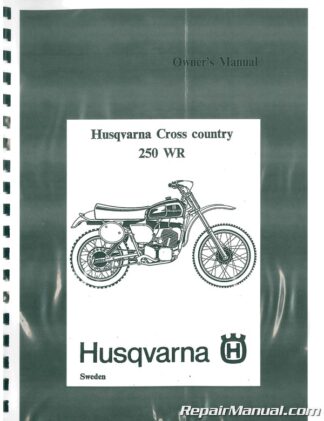Description
This Husqvarna Cross Country 250WR Air Cooled Motorcycle Owners Manual is a high quality reprint of the original out of print book that provides service and maintenance information for Husqvarna Cross Country 250 WR motorcycles. Covers 6-Speed transmission models.
Table of Contents
Technical data
Controls – Clutch handle, Brake handle, Throttle control handle, Handlebar , Fuel cock, Choke Tickler, Kick starter pedal, Brake pedal, Gear lever
Engine – General, Removing and fitting, inspection , Time for repairs
Transmission – General, Clutch repairs, Oil changing, Gear lever, Chain, sprocket, Gearing, Drive chain , Time for repair
Fuel System – Idling speed, High speed, Cold start system, Fuel supply system, Reed valves, Fuel mixture, Fuel cock, Choke, Tickler , Carburetor adjustment, Warning, Air filter, Cleaning carburetor, Changing throttle wire
Electrical and ignition system – Spark plug, Spark gap, Heat rating, Appearance of the spark plug, Removing and fitting, Ignition system
Front Fork – Oil changing, Spring, Adjusting bearing, Damping diagram
Rear fork – Suspension unit, General, Function, Mounting, Rear swing-arm, Changing needle-bearings
Wheels and brakes – Front wheel, Replacing bearings, Rear wheel, Removing rear wheel, Replacing bearings, Wheel alignment, Chain track , Brakes , Replacing brake shoes, Adjusting brakes, Tires, Removing, Fitting
Tools
Accessories
Running
General servicing
Fault tracing schedule
Training program
Competition
Conversion tables
The following is a sample of text from the competition section of this manual:
Check that all the nuts and bolts are tight. Use box spanners. The engine should be run warm when carrying out these checks. Listen for any unusual noise or knocking both at low speed and high speed, and when the engine is under load in high gear.
The most usual cause of engine knocking is incorrect ignition timing and overheating. In order to avoid engine seizure or unnecessary piston wear, any signs of knocking must be corrected immediately. Other noises (squeaks) can be a result of piston wear or play in the big-end and main bearings. Noise can also occur due to wear on the throttle or carburetor body. Feel around the cylinder head with the hand to find whether there is any gas leakage. When checking the tightness of the cylinder head studs, always use a box spanner. Check the idling speed. For adjusting, see the instruction in the Owner’s Manual. Tighten all the engine mounting bolts.
Remove the air filter, clean it and put new oil in it. See page 30. This must be done before each competition.
Check the tightness of the air cleaner on the frame and its sealing against the carburetor.
Clean the outside of the carburetor if necessary.
Tighten the screws on the reed valve housing. Check the tightness of the carburetor on the valve housing.
Adjust the carburetor. See page 28.
Check that the throttle control handle can move easily at full handlebar lock on both sides and that the engine speed is not altered due to any tension in the cable. The cable must not be attached to the frame with insulating tape or similar but should be completely free between the carburetor and throttle control handle.
Check that:
The tank does not leak.
The tank cap docs not leak.
The fuel cock does not leak.
The fuel cock strainer is not blocked up.
The fuel lines are undamaged and do not leak.


 SKU: HUSQ-P-1976-360CR
SKU: HUSQ-P-1976-360CR SKU: HUSQ-P-1976-175CC
SKU: HUSQ-P-1976-175CC SKU: HUSQ-P-400WR
SKU: HUSQ-P-400WR

